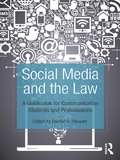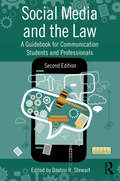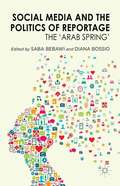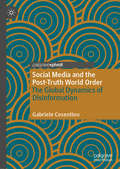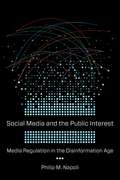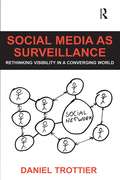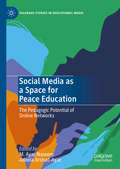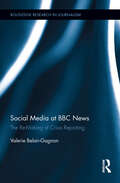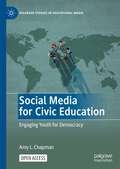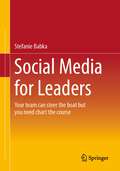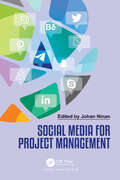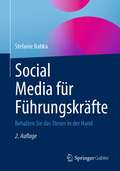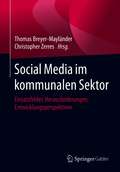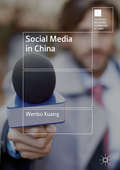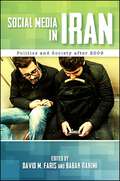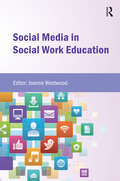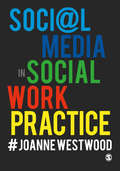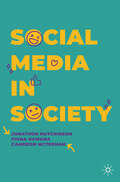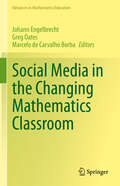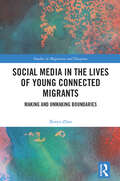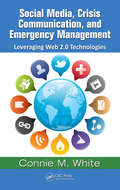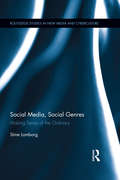- Table View
- List View
Social Media and the Law: A Guidebook for Communication Students and Professionals
by Daxton R. “Chip” StewartSocial media platforms like Facebook, Twitter, Pinterest, YouTube, and Flickr allow users to connect with one another and share information with the click of a mouse or a tap on a touchscreen—and have become vital tools for professionals in the news and strategic communication fields. But as rapidly as these services have grown in popularity, their legal ramifications aren’t widely understood. To what extent do communicators put themselves at risk for defamation and privacy lawsuits when they use these tools, and what rights do communicators have when other users talk about them on social networks? How can an entity maintain control of intellectual property issues—such as posting copyrighted videos and photographs—consistent with the developing law in this area? How and when can journalists and publicists use these tools to do their jobs without endangering their employers or clients? In Social Media and the Law, eleven media law scholars address these questions and more, including current issues like copyright, online impersonation, anonymity, cyberbullying, sexting, and WikiLeaks. Students and professional communicators alike need to be aware of laws relating to defamation, privacy, intellectual property, and government regulation—and this guidebook is here to help them navigate the tricky legal terrain of social media.
Social Media and the Law: A Guidebook for Communication Students and Professionals
by Daxton StewartSocial media platforms like Facebook, Twitter, Instagram, YouTube, and Snapchat allow users to connect with one another and share information with the click of a mouse or a tap on a touchscreen—and have become vital tools for professionals in the news and strategic communication fields. But as rapidly as these services have grown in popularity, their legal ramifications aren’t widely understood. To what extent do communicators put themselves at risk for defamation and privacy lawsuits when they use these tools, and what rights do communicators have when other users talk about them on social networks? How can an entity maintain control of intellectual property issues—such as posting copyrighted videos and photographs—consistent with the developing law in this area? How and when can journalists and publicists use these tools to do their jobs without endangering their employers or clients? Including two new chapters that examine First Amendment issues and ownership of social media accounts and content,?Social Media and the Law brings together thirteen media law scholars to address these questions and more, including current issues like copyright, online impersonation, anonymity, cyberbullying, sexting, and live streaming. Students and professional communicators alike need to be aware of laws relating to defamation, privacy, intellectual property, and government regulation—and this guidebook is here to help them navigate the tricky legal terrain of social media.
Social Media and the Politics of Reportage
by Saba Bebawi Diana BossioSocial Media and the Politics of Reportage explores the journalistic challenges, issues and opportunities that have risen as a result of social media increasingly being used as a form of crisis reporting within the field of global journalism, with a focus on the protests during the 'Arab Spring'.
Social Media and the Post-Truth World Order: The Global Dynamics of Disinformation
by Gabriele CosentinoThis book discusses post-truth not merely as a Western issue, but as a problematic political and cultural condition with global ramifications. By locating the roots of the phenomenon in the trust crisis suffered by liberal democracy and its institutions, the book argues that post-truth serves as a space for ideological conflicts and geopolitical power struggles that are reshaping the world order. The era of post-truth politics is thus here to stay, and its reach is increasingly global: Russian trolls organizing events on social media attended by thousands of unaware American citizens; Turkish pro-government activists amplifying on Twitter conspiracy theories concocted via Internet imageboards by online subcultures in the United States; American and European social media users spreading fictional political narratives in support of the Syrian regime; and Facebook offering a platform for a harassment campaign by Buddhist ultra-nationalists in Myanmar that led to the killing of thousands of Muslims. These are just some of the examples that demonstrate the dangerous effects of the Internet-driven global diffusion of disinformation and misinformation. Grounded on a theoretical framework yet written in an engaging and accessible way, this timely book is a valuable resource for students, researchers, policymakers and citizens concerned with the impact of social media on politics.
Social Media and the Public Interest: Media Regulation in the Disinformation Age
by Philip M. NapoliFacebook, a platform created by undergraduates in a Harvard dorm room, has transformed the ways millions of people consume news, understand the world, and participate in the political process. Despite taking on many of journalism’s traditional roles, Facebook and other platforms, such as Twitter and Google, have presented themselves as tech companies—and therefore not subject to the same regulations and ethical codes as conventional media organizations. Challenging such superficial distinctions, Philip M. Napoli offers a timely and persuasive case for understanding and governing social media as news media, with a fundamental obligation to serve the public interest.Social Media and the Public Interest explores how and why social media platforms became so central to news consumption and distribution as they met many of the challenges of finding information—and audiences—online. Napoli illustrates the implications of a system in which coders and engineers drive out journalists and editors as the gatekeepers who determine media content. He argues that a social media–driven news ecosystem represents a case of market failure in what he calls the algorithmic marketplace of ideas. To respond, we need to rethink fundamental elements of media governance based on a revitalized concept of the public interest. A compelling examination of the intersection of social media and journalism, Social Media and the Public Interest offers valuable insights for the democratic governance of today’s most influential shapers of news.
Social Media as Social Science Data (Strategies for Social Inquiry)
by Steven Lloyd WilsonSocial media has put mass communication in the hands of normal people on an unprecedented scale, and has also given social scientists the tools necessary to listen to the voices of everyday people around the world. This book gives social scientists the skills necessary to leverage that opportunity, and transform social media's vast stream of information into social science data. The book combines the big data techniques of computer science with social science methodology. Intended as a text for advanced undergraduates, graduate students, and researchers in the social sciences, this book provides a methodological pathway for scholars who want to make use of this new and evolving source of data. It provides a framework for building one's own data collection and analysis infrastructure, a toolkit of content analysis, geographic analysis, and network analysis, and meditations on the ethical implications of social media data.
Social Media as Surveillance: Rethinking Visibility in a Converging World
by Daniel TrottierWhile there is a lot of popular and academic interest in social media, this is the first academic work which addresses its growing presence in the surveillance of everyday life. Some scholars have considered its impact on privacy, but these efforts overlook the broader risks for users. Commonsense recommendations of care and vigilance are not enough, as attempts to manage an individual presence are complicated by the features which make social media 'social'. Facebook friends routinely expose each other, and this information leaks from one context to another. This book develops a surveillance studies approach to social media by presenting first hand ethnographic research with a variety of personal and professional social media users. Using Facebook as a case-study, it describes growing monitoring practices that involve social media. What makes this study unique is that it not only considers social media surveillance as multi-purpose, but also shows how these different purposes augment one another, leading to a rapid spread of surveillance and visibility. Individual, institutional, market-based, security and intelligence forms of surveillance therefore co-exist with each other on the same site. Not only are they drawing from the same interface and information, but these practices also augment each other. This groundbreaking research considers the rapid growth and volatility of social media technology by treating these aspects as central to social media surveillance.
Social Media as a Space for Peace Education: The Pedagogic Potential of Online Networks (Palgrave Studies in Educational Media)
by M. Ayaz Naseem Adeela Arshad-AyazThis book explores the potential of social media as a space for teaching and bringing about sustainable peace. Using cutting-edge research, the editors and authors analyze the fundamental transformations taking place in the digital and interactive public sphere, most recently with the advent of the ‘post-truth’ age and the impact of this upon young people’s perceptions of ‘friend’ and ‘foe’. Peace initiatives at almost every level recognize the importance of education for sustainable peace: this volume examines the opportunities emerging from these societal transformations for both formal and informal education. This book will appeal to students and scholars of social media, peace education and the post-truth age.
Social Media at BBC News: The Re-Making of Crisis Reporting (Routledge Research in Journalism)
by Valerie Belair-GagnonSince the emergence of social media in the journalistic landscape, the BBC has sought to produce reporting more connected to its audience while retaining its authority as a public broadcaster in crisis reporting. Using empirical analysis of crisis news production at the BBC, this book shows that the emergence of social media at the BBC and the need to manage this kind of material led to a new media logic in which tech-savvy journalists take on a new centrality in the newsroom. In this changed context, the politico-economic and socio-cultural logic have led to a more connected newsroom involving this new breed of journalists and BBC audience. This examination of news production events shows that in the midst of transformations in journalistic practices and norms, including newsgathering, sourcing, distribution and impartiality, the BBC has reasserted its authority as a public broadcaster. Click here for a short video about the book.
Social Media for Civic Education: Engaging Youth for Democracy (Palgrave Studies in Educational Media)
by Amy L. ChapmanThis open access book provides the theoretical and pedagogical foundations for a promising new approach to civic education: using social media to teach civics. While many measures indicate that youth civic engagement has long been in decline, many of these measures fail to take into account all of the ways that youth can interact with civic life. One of these understudied ways is through social media, including platforms like Twitter, where young people have the opportunity to encounter the news, engage with people in power, and bring attention to the needs in their community. Throughout this volume, Chapman explores how and why teachers can use social media to teach civics, as well as how it might meet the needs of students in ways other approaches do not.
Social Media for Leaders : Your team can steer the boat but you need chart the course
by Stefanie BabkaThis book provides you with a concise and accurate overview of the key business challenges, opportunities and risks related to social media. Regardless of the type and size of company or department you manage, whether you offer industrial goods, consumer goods or services - social media is a factor you should monitor and manage. Stefanie Babka helps you ask yourself and your employees the right questions, find answers and thus face the internal challenges. Because social media is a management task. For example, the following questions are highlighted: Are you aware of the risks of uncoordinated and improper use of social media by your employees in their private or professional lives? Have you taken everything into account in terms of data protection law, or do you already have one foot in jail as a manager? Are you spending too much money on social media campaigns? Do you have the right social media strategy? Is it aligned with your company's goals? Are you in control or does social media anarchy reign in your company? What opportunities and risks do internal social media applications bring for collaboration in teams or organizational units? How can social media be used as a strategic management tool? Social media concerns every company. Whether you like it or not. For the 2nd edition, all contents have been revised and the chapter "As a manager on the social web" has been expanded to include, among other things, the topic of virtual management and leading virtual teams.
Social Media for Project Management
by Johan NinanThe number of projects is increasing worldwide as traditional and repetitive tasks are carried out through automation. Projects being temporary and unique while being adopted globally across sectors presents a challenge for the effective management of environmental, economic, and social parameters. Projects are people centric and require the effective management of internal and external stakeholders. In the modern age, social media is seen as a tool that connects people across the world having significant implications on everyone’s daily life. Social media is used for different purposes and encompasses multiple affordances as these are often free and also bring together people from different walks of life who tend to use them differently. However, the role of social media in managing projects is still under explored. In this edited book, multiple authors working on the application of social media in projects come together to craft an agenda for the future. First, the use of social media for internal stakeholders, such as managers and engineers, are discussed. Following this, the use of social media for external stakeholders, such as communities and project affected persons are discussed. Finally, the guidelines for education using social media and research using social media is discussed. Thus, the book brings together multiple authors to discuss how social media can be used in project settingsto facilitate interactions and strategic conversations across hierarchical levels and geographic boundaries for diverse goals. The book is a valuable resource for all project management academics, researchers and practitioners who are interested in learning about the application of social media in project settings.
Social Media für Führungskräfte: Behalten Sie das Steuer in der Hand
by Stefanie BabkaDieses Buch bietet Ihnen einen knappen und präzisen Überblick zu den wichtigsten unternehmerischen Herausforderungen sowie Chancen und Risiken in Bezug auf Social Media. Unabhängig davon, welche Art und Größe von Unternehmen oder Abteilung Sie leiten, ob Sie Industriegüter, Konsumgüter oder Dienstleistungen anbieten – Social Media ist ein Faktor, den Sie beobachten und steuern sollten. Stefanie Babka hilft Ihnen dabei, sich und Ihren Mitarbeitern die richtigen Fragen zu stellen, Antworten zu finden und sich so den internen Herausforderungen zu stellen. Denn Social Media ist eine Führungsaufgabe.Dabei werden zum Beispiel folgende Fragestellungen beleuchtet: Sind Sie sich der Risiken von unkoordiniertem und unsachgemäßem Umgang mit Social Media durch Ihre Mitarbeiter im privaten oder beruflichen Umfeld bewusst? Haben Sie datenschutzrechtlich alles beachtet, oder stehen Sie als Führungskraft bereits mit einem Fuß im Gefängnis? Geben Sie zu viel Geld für Social-Media-Kampagnen aus? Haben Sie die richtige Social-Media-Strategie? Orientiert sich diese an den Unternehmenszielen? Haben Sie das Ruder in der Hand oder herrscht in Ihrem Unternehmen Social-Media-Anarchie? Welche Chancen und Risiken bringen interne Social-Media-Anwendungen für die Zusammenarbeit in Teams oder Organisationseinheiten? Wie kann Social Media als strategisches Führungsinstrument genutzt werden? Social Media geht jedes Unternehmen an. Ob Sie wollen oder nicht.Für die 2. Auflage wurden alle Inhalte überarbeitet und das Kapitel „Als Führungskraft im Social Web“ wurde unter anderem um das Thema virtuelles Management und Führung von virtuellen Teams erweitert.
Social Media im kommunalen Sektor: Einsatzfelder, Herausforderungen, Entwicklungsperspektiven
by Thomas Breyer-Mayländer Christopher ZerresDieses Buch gibt einen Überblick über den Einsatz unterschiedlicher Social-Media-Kanäle für die Kommunikation von Gemeinden, Städten und Ämtern und liefert Verwaltungsverantwortlichen, politischen Akteuren, öffentlichen Gremien oder Eventveranstaltern wertvolle Erkenntnisse. Durch das veränderte Informations- und Mediennutzungsverhalten gewinnen Social Media als Kanäle für die kommunale Kommunikation von Politik und Verwaltung zunehmend an Bedeutung. Dies stellt viele Akteure vor neue Herausforderungen, u. a. weil die dezentrale, eigenverantwortliche Kommunikation einigen Grundprinzipien und Traditionen der öffentlichen Verwaltung widerspricht.Experten aus Wissenschaft und Praxis beschreiben in diesem Werk Voraussetzungen, Anwendungsbereiche und Grenzen des Einsatzes von sozialen Medien im Verwaltungssektor und geben Einblicke anhand von konkreten Beispielen. Ein Buch für Verwaltungs- und Marketingpraktiker, politische Entscheider, Mitarbeitende in Agenturen und regional zuständigen Planungs- und Verwaltungseinrichtungen sowie Studierende in den Bereichen Marketing, Verwaltung und Stadtplanung.
Social Media in China (Sociology, Media And Journalism In China)
by Wenbo KuangRedefining the concept of new media in China, this cutting edge book discusses the impact of social media on Chinese public life. Examining its characteristics and the different forms of social media, such as internet and mobile phone media, weibo, wechat and micro-blogging, it considers how public opinion evolves through this media and its interaction with traditional media. It also offers a unique analysis of growing new media platforms, the challenges of government management and the impact of micro-blogging on journalism in China. Through quantitative research, the book also analyses new media user behavior in China, offering a ‘butterfly effect’ model for public opinion based on new media. It also shows the relevance of the sociological Matthew Effect and addresses issues such as the ‘20 million’ phenomenon and the Internet Water army (Wangluo shuijun), groups of Internet ghost-writers paid to post specific content online. Finally, it scrutinizes the the issue of mass disturbance in new media in China, researching evolutionary mechanisms and academic models of mass disturbance through a series of case studies.Written by a leader in the field of Chinese new media, this book constitutes a valuable read to scholars of media and communications studies, and all those interested by the development and the increasing impact of new media in China.
Social Media in Iran: Politics and Society after 2009
by David M. Faris; Babak RahimiSocial Media in Iran is the first book to tell the complex story of how and why the Iranian people—including women, homosexuals, dissidents, artists, and even state actors—use social media technology, and in doing so create a contentious environment wherein new identities and realities are constructed. Drawing together emerging and established scholars in communication, culture, and media studies, this volume considers the role of social media in Iranian society, particularly the time during and after the controversial 2009 presidential election, a watershed moment in the postrevolutionary history of Iran. While regional specialists may find studies on specific themes useful, the aim of this volume is to provide broad narratives of actor-based conceptions of media technology, an approach that focuses on the experiential and social networking processes of digital practices in the information era extended beyond cultural specificities. Students and scholars of regional and media studies will find this volume rich with empirical and theoretical insights on the subject of how technologies shape political and everyday life.
Social Media in Social Work Education
by Joanne WestwoodThere has been a recent growth in the use of social media tools in social work education. This edited text presents a series of chapters which discuss social media activities and how they can contribute to student learning, and social work practice. The contributors, all innovators in the use of social media, introduce the landscape and discuss how social media activities have begun to impact on both social work education and on practice. The professional codes of practice and the values and ethics questions such activities can raise are introduced and explored across the chapters.Packed with practical examples and exercises, this innovative textbooks is a useful tool for students, practitioners and academics new to using social media in their teaching.
Social Media in Social Work Practice
by Joanne WestwoodShould you respond to friend requests from service users? How can you be sure that your own online profile is secure? Do service users understand the global and permanent nature of social media posts? Mapped against UK regulatory bodies’ standards this book responds to new complex issues raised by social media. Joanne Westwood draws on evidence and contemporary examples from practice to contextualise developments in social media and outline how this has shaped social work practice in recent years. She unpicks the potential pitfalls and opportunities social media presents for individual practice, organisations and service users. After using the case study questions, quizzes and reflective activities you will be able to confidently apply your knowledge of the 4 key issues: · privacy · confidentiality · regulation · professional ethics and values
Social Media in Social Work Practice
by Joanne WestwoodShould you respond to friend requests from service users? How can you be sure that your own online profile is secure? Do service users understand the global and permanent nature of social media posts? Mapped against UK regulatory bodies’ standards this book responds to new complex issues raised by social media. Joanne Westwood draws on evidence and contemporary examples from practice to contextualise developments in social media and outline how this has shaped social work practice in recent years. She unpicks the potential pitfalls and opportunities social media presents for individual practice, organisations and service users. After using the case study questions, quizzes and reflective activities you will be able to confidently apply your knowledge of the 4 key issues: · privacy · confidentiality · regulation · professional ethics and values
Social Media in Society
by Jonathon Hutchinson Fiona Suwana Cameron McTernanThis book is about the role that social media plays in the lives of individuals, societies, economies and polities. It therefore takes in a wide view of the emergent and changing impacts of social media platforms, and social media practices. As a consequence, it examines social media use through various intellectual and scholarly traditions --psychology, sociology, cultural studies, economics, and (national and global) politics – but it is primarily situated in the field of media and communications studies. As such, it frames its analysis of social media impacts using media studies concepts and terminology, and places media texts, forms, industries and agents (producers, audiences and other users) at the centre of each thematic chapter.
Social Media in the Changing Mathematics Classroom (Advances in Mathematics Education)
by Johann Engelbrecht Greg Oates Marcelo de Carvalho BorbaThis edited volume gathers contributions from international scholars focusing on social media's role and impact on mathematics education. Social media's integration into pedagogical strategies (from social networking sites to video-sharing platforms) offers the opportunity to enhance learning by fostering connectivity and engagement among students, ultimately improving mathematical understanding in educational settings. This text aims to provide guidance on the facilitation of peer learning and collaboration, as well as highlighting the necessary shift in traditional methods to include cyber assistance in the learning process. The book discusses how social media aligns with social-constructivist theories of learning, its consistency with the process of developing students into independent learners and provides means to ensuring educators remain relevant and connected to students' preferred modes of learning. Challenges and benefits of the use of social media tools in teaching are also detailed. Examining the potential for effective integration of social media in the classroom, this book is a valuable resource for educators, practitioners and researchers interested in mathematics education.
Social Media in the Lives of Young Connected Migrants: Making and Unmaking Boundaries (ISSN)
by Xinyu ZhaoDigital media are a key part of everyday social life for international migrants. However, we don’t know enough about how these migrants critically understand and cope with the cultures and infrastructures of ubiquitous connectivity while on the move. Social Media in the Lives of Young Connected Migrants explores and theorises what it means for young migrants to live in a digital age. Presenting a richly detailed analysis of Chinese international students’ everyday social media practices, the book unravels the meanings of digital connectivity in general and how contemporary mobile young generations respond to such changes. Drawing on ethnographic and interview data, this book highlights the enabling aspects of connective media in migration journeys and shows how and why young Chinese migrants manage or even resist being connected. With close attention to diasporic, intercultural, family, and professional migrant identities and relationships, the author provides a nuanced account of living with digital media in everyday settings. Focusing on the boundary practices associated with social media, the book offers a unique analytical framework through which to capture the complex intersections of digital communication technologies and migrant social life. This volume will appeal to students and scholars interested in researching Chinese diasporas, digital migration, and youth cultures.
Social Media in the Lives of Young Connected Migrants: Making and Unmaking Boundaries (Studies in Migration and Diaspora)
by Xinyu ZhaoDigital media are a key part of everyday social life for international migrants. However, we don’t know enough about how these migrants critically understand and cope with the cultures and infrastructures of ubiquitous connectivity while on the move. Social Media in the Lives of Young Connected Migrants explores and theorises what it means for young migrants to live in a digital age. Presenting a richly detailed analysis of Chinese international students’ everyday social media practices, the book unravels the meanings of digital connectivity in general and how contemporary mobile young generations respond to such changes. Drawing on ethnographic and interview data, this book highlights the enabling aspects of connective media in migration journeys and shows how and why young Chinese migrants manage or even resist being connected. With close attention to diasporic, intercultural, family, and professional migrant identities and relationships, the author provides a nuanced account of living with digital media in everyday settings. Focusing on the boundary practices associated with social media, the book offers a unique analytical framework through which to capture the complex intersections of digital communication technologies and migrant social life. This volume will appeal to students and scholars interested in researching Chinese diasporas, digital migration, and youth cultures.
Social Media, Crisis Communication, and Emergency Management: Leveraging Web 2.0 Technologies
by Connie M. WhiteAlthough recent global disasters have clearly demonstrated the power of social media to communicate critical information in real-time, its true potential has yet to be unleashed. Social Media, Crisis Communication, and Emergency Management: Leveraging Web 2.0 Technologies teaches emergency management professionals how to use social media to improve
Social Media, Social Genres: Making Sense of the Ordinary (Routledge Studies in New Media and Cyberculture)
by Stine LomborgInternet-based applications such as blogs, social network sites, online chat forums, text messages, microblogs, and location-based communication services used from computers and smart phones represent central resources for organizing daily life and making sense of ourselves and the social worlds we inhabit. This interdisciplinary book explores the meanings of social media as a communicative condition for users in their daily lives; first, through a theoretical framework approaching social media as communicative genres and second, through empirical case studies of personal blogs, Twitter, and Facebook as key instances of the category of "social media," which is still taking shape. Lomborg combines micro-analyses of the communicative functionalities of social media and their place in ordinary people’s wider patterns of media usage and everyday practices.
